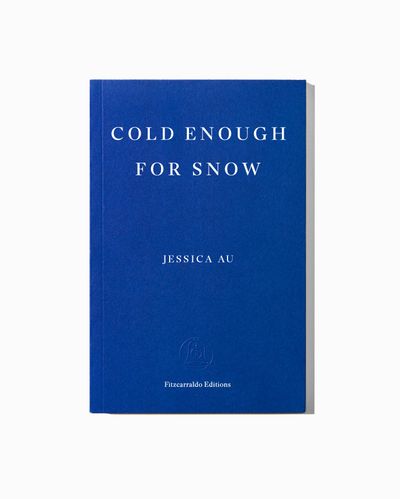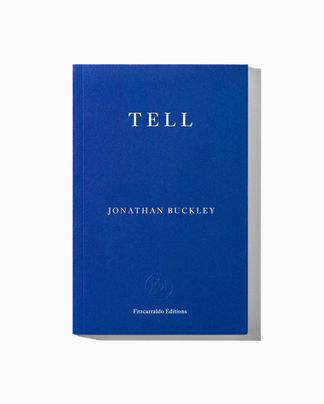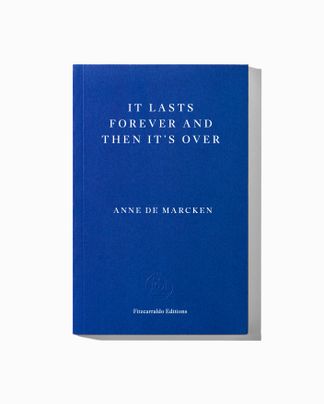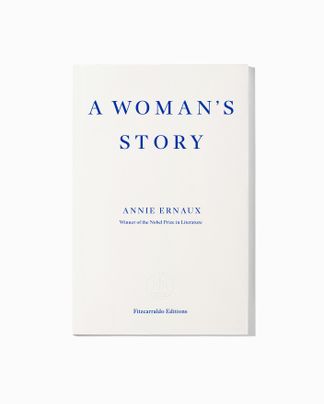A mother and daughter travel from abroad to meet in Tokyo: they walk along the canals through the autumn evenings, escape the typhoon rains, share meals in small cafés and restaurants, and visit galleries to see some of the city’s most radical modern art. All the while, they talk: about the weather, horoscopes, clothes, and objects, about family, distance, and memory. But uncertainties abound. Who is really speaking here – is it only the daughter? And what is the real reason behind this elliptical, perhaps even spectral journey? At once a careful reckoning and an elegy, Cold Enough for Snow questions whether any of us speak a common language, which dimensions can contain love, and what claim we have to truly know another’s inner world.

Cold Enough for Snow
Published 23 February 2022 | French paperback with flaps, 104 pages
Winner of the Readings Prize – New Australian Fiction 2022 | Winner of the Victorian Premier’s Literary Award for Fiction 2023 | Winner of the Victorian Prize for Literature 2023 | Longlisted for the 2023 Australian Indie Book Awards | Longlisted for the Dublin Literary Award 2023
Cold Enough for Snow
When we left the hotel it was raining, a light, fine rain, as can sometimes happen in Tokyo in October. I said that where we were going was not far – we would only need to get to the station, the same one that we had arrived at yesterday, and then catch two trains and walk a little down some small streets until we got to the museum. I got out my umbrella and opened it, and pulled up the zipper of my coat. It was early morning and the street was filled with people, most walking away from the station, rather than towards it as we were. All the while, my mother stayed close to me, as if she felt that the flow of the crowd was a current, and that if we were separated, we would not be able to make our way back to each other, but continue to drift further and further apart. The rain was gentle, and consistent. It left a fine layer of water on the ground, which was not asphalt, but a series of small, square tiles, if you cared enough to notice.
We had arrived the night before. My plane landed an hour before my mother’s and I waited for her at the airport. I was too tired to read but collected my bags and bought us two tickets for one of the express trains, as well as a bottle of water and some cash from the ATM. I wondered if I should buy more – some tea perhaps, or something to eat, but I did not know how she would be feeling when she landed. When she came out of the gates, I recognised her immediately, even from a distance, somehow by the way she held herself or the way she walked, without being able to clearly see her face. Up close, I noticed that she continued to dress with care: a brown shirt with pearl buttons, tailored pants and small items of jade. It had always been that way. Her clothes were not expensive, but were chosen with attention to the cut and fit, the subtle combination of textures. She looked like a well-dressed woman in a movie from maybe twenty or thirty years ago, both dated and elegant. I saw too that she had with her a large suitcase, the same one I remembered from our childhood. She’d kept it on top of the cupboard in her room, where it had loomed over us, mostly unused, only brought down for the few trips she’d made back to Hong Kong, like for when her father died, and then her brother. There was hardly a mark on it, and even now, it seemed almost new.
Earlier in the year, I had asked her to come with me on a trip to Japan. We did not live in the same city anymore, and had never really been away together as adults, but I was beginning to feel that it was important, for reasons I could not yet name. At first, she had been reluctant, but I had pushed, and eventually she had agreed, not in so many words, but by protesting slightly less, or hesitating over the phone when I asked her, and by those acts alone, I knew that she was finally signalling that she would come. I had chosen Japan because I had been there before, and although my mother had not, I thought she might be more at ease exploring another part of Asia. And perhaps I felt that this would put us on equal footing in some way, to both be made strangers. I had decided on autumn, because it had always been our favourite season. The gardens and parks would be at their most beautiful then; the late season, everything almost gone. I had not anticipated that it might still be a time for typhoons. Already, the weather reports had contained several warnings, and it had been raining steadily since our arrival.
At the station, I gave my mother her metro card and we passed through the turnstiles. Inside, I searched for the train line and platform that we needed, trying to match the name and colours to what I had marked on the map the night before. Eventually, I found the right connection. On the platform, the ground had been marked to indicate where you could line up to board. We took our place obediently and the train arrived within minutes. There was a single spare seat close to the door, and I indicated that she should sit, while I stood next to her and watched as the stations passed us by. The city was grey and concrete, dull in the rain and not entirely unfamiliar. I recognised the form of everything – buildings, overpasses, train crossings – but in their details, their materials, they were all slightly different, and it was these small but significant changes that continued to absorb me. After about twenty minutes, we switched to a smaller line and a less crowded train, and this time I was able to sit next to her, watching as the height of the buildings grew lower and lower, until we were in the suburbs, and they became homes, with white walls and flat roofs and compact cars parked in the driveways. It struck me that the last time I had been here, I was with Laurie, and thinking on and off about my mother. And now, I was here with her, thinking on and off about him, about how we had rushed around the city from morning to long after dark, seeing everything, taking in everything. During that trip, it was like we were children again, mad and excitable, endlessly talking, endlessly laughing, always hungry for more. I remembered thinking that I had wanted to share some of this with my mother, even if just a small amount. It was after that journey that I had begun learning Japanese, as if subconsciously planning for this one.
(…)
‘Slim, beautifully simple … Au’s new work … shows that she has learnt to play to her strengths.… She finds momentum in the closely observed oscillations of a single relationship.’
— Baya Simons, Financial Times
‘Au’s novel is … masterly in the way it evokes our dissociation from desire – our own and other people’s…. We can sense it in the soft, patient warmth of Au’s prose, which sometimes feels attuned to truths just out of the narrator’s reach.’
— Peter C. Baker, New Yorker
‘This slim, expertly crafted and beguiling novella that flits between the past and present was the inaugural winner of the international Novel Prize. There is an absolute certainty to Jessica Au’s prose, but the evanescent story she tells – of a young woman who takes her mother on a trip to Japan, their conversations and reflections on their lives – abounds with ambiguities.’
— Jason Steger, Sydney Morning Herald
‘This novella is graceful and precise. Like the narrator fine-tuning the aperture on her Nikon camera, Au seems to say, we have to choose our scale, what we pay attention to…. Finally, we bump up against what is not knowable. Au has mentioned her taste for “subverting narrative expectation … open endings, scenes in which nothing happens yet everything happens”. Cold Enough for Snow is exactly this, a book of inference and small mysteries. The stories, memories and images Au puts on the table escape easy conclusions.… Aesthetic, opaque, endlessly uncoiling.’
— Imogen Dewey, Guardian
‘Jessica Au finds poetry in meandering, slippery transitions between anecdotes, with their nebulous timelines and transcontinental trajectories.’
— Los Angeles Review of Books
‘This clever, phantom-like work eludes definition.’
— Catherine Taylor, Guardian
‘Au’s is a book of deceptive simplicity, weaving profound questions of identity and ontology into the fabric of quotidian banality…. What matters, the novel reassures us, is constantly imbricated with the everyday, just as alienation and tender care can coexist in the same moment.’
— Claire Messud, Harpers
‘[A]n amazing book. Au is astounding.’
— Bryan Washington, Elle
‘Rarely have I been so moved, reading a book: I love the quiet beauty of Cold Enough for Snow and how, within its calm simplicity, Jessica Au camouflages incredible power.’
— Édouard Louis, author of Who Killed My Father
‘So calm and clear and deep, I wished it would flow on forever.’
— Helen Garner, author of The First Stone
‘Au’s writing ebbs along effortlessly and poetically.’
— The Australian
‘Jessica Au is a new talent to be watched.’
— Romy Ash, Australian Book Review
‘The book relates the journey of the narrator, a woman in her twenties, and her mother who visit Japan in the autumn. On this fictional trip, the two women discuss art and their room sand the weather, which might be boring if it weren’t for Au’s svelte sentences and hypnotic sense of rhythm. Almost imperceptibly, the tale becomes more complex.… What begins simply ends in uncertainty.’
— 032c
‘It’s a beautifully crafted novel about connection that asks if we can ever truly know the people closest to us.’
— Katie Goh, i-D Magazine
‘Flawed understanding, consolation, and insufficiency all infuse this compelling, unsettling novel reminiscent of Jhumpa Lahiri’s Whereabouts or Rachel Cusk’s Outline trilogy. A beautifully observed book, written in precise, elegant prose that contains a wealth of deep feeling.’
— Kirkus starred review
‘Quietly deft and moving.’
— Ellen Pierson-Hagger, New Statesman
‘Cold Enough for Snow … is a fresh venture down the road of migratory stories, ones that explore the fault lines that distance can create between members of the same family…. For all of us who are rendered far from our families by these distances, the book asks us, what can we share with our parents that keeps us tethered to them?’
— Jimin Kang, The Oxonian Review
‘A triumph of subtlety and precision, its observations piercing yet compassionate, fleeting yet profound … this book feels like a deep, slow breath of fresh air.’
— Rachel Farmer, Lunate
‘Cold Enough for Snow … is dreamlike, between traum und trauma, in its aethereal cadences. And if Au is striking out for herself, the essence of the move is in her patient manner: not self-restrained (as trauma might be) but self-measured (as a slow dream might be). Her prose is serenely executed: astutely and expertly.’
—Joshua Calladine-Jones, Hong Kong Review of Books
’Cold Enough for Snow is a generous meditation on the subjectivity of experience, and how the stories held within a family can be strangely disparate, especially when migration is part of their history…. Above all, this is a book which resists any easy summary, offering the reader the complexities of experience itself.’
— Andy Jackson, The Saturday Paper
‘Cold Enough for Snow is a reckoning and an elegy: with extraordinary skill, Au creates an enveloping atmosphere that expresses both the tenderness between mother and daughter, and the distance between them.’
— Jackie Tang, Readings Monthly
‘[Cold Enough for Snow] is melancholic and wistful, but Au finds grace and succour in the small act of observing people, places and art.’
— Ben East, Guardian
‘[Au’s] calm, precise prose encourages a slowing…. [Cold Enough for Snow] is about … looking closely, contemplating, being patient enough to let the world seep in, especially the small but beautiful things, while being comfortable with what goes unsaid.’
— Insights
‘A fascinating, touching story that becomes a meditation on the link between sensory experience and the intangibility of memory, ultimately asking how our lives can both recapitulate and diverge from those of the people around us.’
— David Griffiths, Buzz Magazine
‘Captivating, thought-provoking, and a joy to read, Cold Enough for Snow was a truly absorbing experience.’
— Caroline Spalding, Yorkshire Times
Jessica Au is a writer based in Melbourne, Australia. Cold Enough for Snow won the inaugural Novel Prize, run by Giramondo, New Directions and Fitzcarraldo Editions, and is set to be published in eighteen countries.




